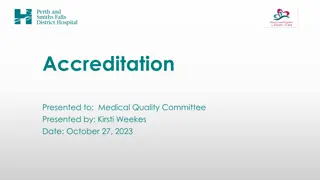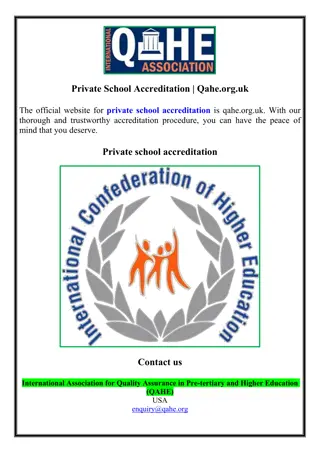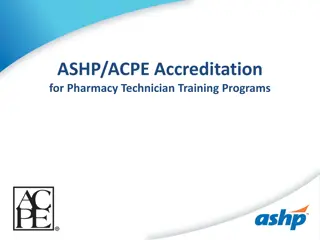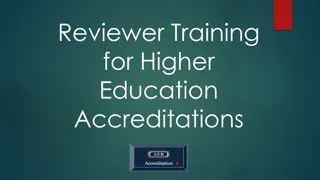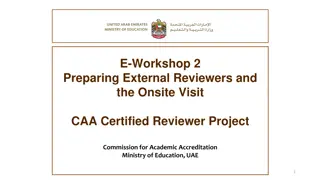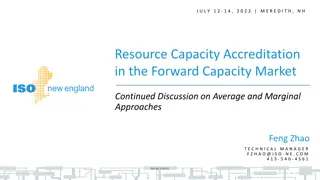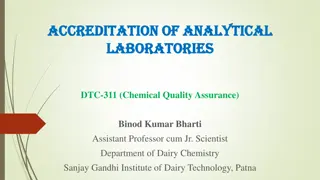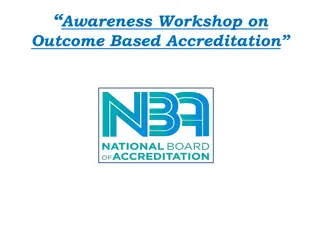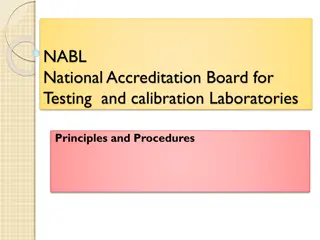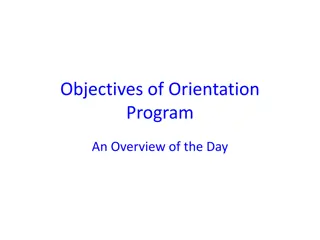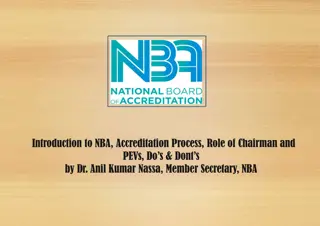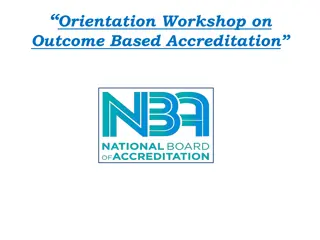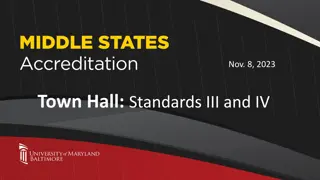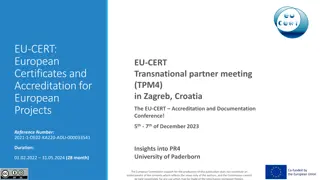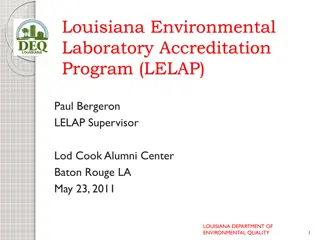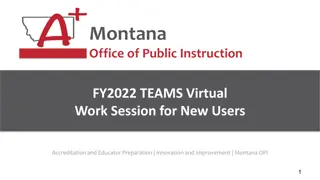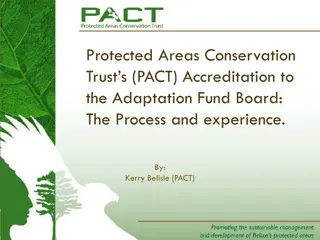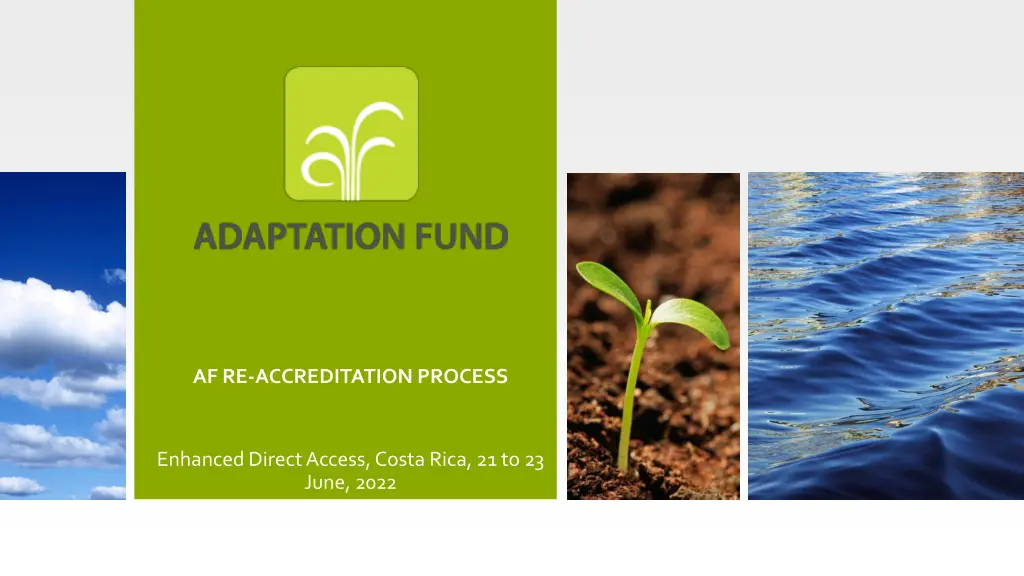
Re-accreditation Process Guidelines and Deadlines
"Learn about the re-accreditation process for implementing entities, including key decisions, new deadlines, and implications of different status levels. Understand the requirements for maintaining accreditation and how to avoid becoming Not-Accredited."
Download Presentation

Please find below an Image/Link to download the presentation.
The content on the website is provided AS IS for your information and personal use only. It may not be sold, licensed, or shared on other websites without obtaining consent from the author. If you encounter any issues during the download, it is possible that the publisher has removed the file from their server.
You are allowed to download the files provided on this website for personal or commercial use, subject to the condition that they are used lawfully. All files are the property of their respective owners.
The content on the website is provided AS IS for your information and personal use only. It may not be sold, licensed, or shared on other websites without obtaining consent from the author.
E N D
Presentation Transcript
AF RE-ACCREDITATION PROCESS Enhanced Direct Access, Costa Rica, 21 to 23 June, 2022
Background Key Decisions Fund s Operational Policies and Guidelines (OPG), Accreditation is valid for a period of five years with the possibility of renewal At its twenty-second meeting, the Board decided to adopt the re-accreditation process outlines in Annex III of the report of the fourteenth meeting of the Accreditation Panel (Document AFB/B.22/4). At its twenty-eight meeting the Adaptation Fund Board decided to fast-track the re-accreditation of implementing entities accredited with the Green Climate Fund (GCF) within a period of four years prior to the submission of the re-accreditation application to the Adaptation Fund as described in document AFB/EFC/19/7 (Decision B.28/38). At its thirtieth meeting the AF Board decided- Decision B.31/1- to adopt the updated re- accreditation process contained in Annex I to the Report of the twenty-seventh meeting of the Accreditation Panel.
New Deadlines The secretariat will continue to send out notification letters to accredited entities 18 months prior to the expiration of the entity s accreditation. In addition, the online accreditation system generates an automatic notification to the implementing entities. NOTIFICATION BY THE SECRETERIAT The implementing entity is strongly recommended to submit its re-accreditation application and supporting documentation through the online accreditation system maintained by the Secretariat, 12 months prior to its accreditation expiry date. If the entity does not submit the application by its accreditation expiry date, the Panel will make a recommendation to the Board to change the status of the entity from Accredited to Not-Accredited at the accreditation expiry date. SUBMISSION OF RE- ACCREDITATION APPLICATION Acquisition of re-accreditation: The implementing entity is strongly recommended to achieve re-accreditation within three years from its accreditation expiry date. If the entity does not achieve re-accreditation within three years from its accreditation expiry date, the Panel will make a recommendation to the Board to change the status of the entity to Not-Accredited ACQUISITION OF RE- ACCREDITATION
Status of an Implementing Entity Accredited: When an implementing entity achieves accreditation following a Board decision, its accreditation is valid for five years In Re-accreditation Process: When an implementing entity submits its re- accreditation application before the accreditation expiry date, it acquires a status of In Re-accreditation Process at its accreditation expiry date, until it achieves re- accreditation within three years from the accreditation expiry date. Not-Accredited: If an implementing entity does not submit re-accreditation application by its accreditation expiry date, or the entity does not achieve re- accreditation within three years from the accreditation expiry date, it acquires the status of Not-Accredited following a Board decision.
Implication of the status of an Implementing Entity Eligible to submit a new funding proposal Eligible to participate in AF activities as IE Eligible to be included in AF communications (1) Accredited Yes Yes Yes (2) No Yes Yes In Re-accreditation Process (3) No No No Not Accredited
Effective date of the update Notification by the secretariat: The secretariat will continue to send out notification letters to accredited entities 18 months prior to the expiration of the entity s accreditation. In addition, the online accreditation system generates an automatic notification to the implementing entities.
Focus areas of review of a Regular re-accreditation Review of a regular re-accreditation will focus on three aspects (i) continued compliance with the Fund s fiduciary standards, (ii) compliance with the Fund s environmental and social policy and the Gender Policy and (iii) the results of the assessment of the implementing entity s performance regarding quality at entry and project/programme implementation.
AF Regular Re-Accreditation process: Balance between Assessment and Capacity Building Demonstration of legal personality Ability to contract with AF and authority to directly receive funds Demonstration of legal capacity to serve as plaintiff or defendant in a Court of law Legal status Financial Management and Integrity Financial Statements, External Audit requirement, Existence of Accounting procedure Internal Control Framework Internal Audit/Assurance and Oversight arrangements Preparation of Business plans and budget
AF Regular Re-Accreditation process: Balance between Assessment and Capacity Building Procurement Project Preparation and Appraisal Project Implementation Planning and Quality at entry review Project Monitoring and Evaluation during implementation Project Closure and Final Evaluation Institutional Capacity Policies and Framework and capacity to deal with fraud, corruption and other forms of malpractice Commitment by the entity to apply the Fund s Environmental & Social and Gender policy Mechanism to deal with complaints on environmental and social harms caused by projects Transparency, Self-investigative Powers, Anti-corruption measures and handling complaints about harmful Gender, Environmental or Social Impact of projects
With or without AF funded Project Section 6 Section 7 Section 8 Section9 Project preparation and appraisal. This should include impact (environment, socio- economic, political, gender etc.) assessment study with risk assessment and mitigation plans No Project implementation Planning and Quality-at- entry Review Project Monitoring Evaluation during implementation and Project closure and final evaluation Yes Yes Yes With approved AF funded Project but no planning and QAE No No Yes Yes With approved AF funded Project, completed planning and QAE but implementation not yet started No No No Yes With approved AF funded Project, and implementing it No No No No With approved AF funded Project, completed with a final report on completion Yes Yes Yes Yes No approved AF funded Project
Fast Track Re-accreditation The GCF accreditation procedures are consistent with those of the Fund and that they can be relied upon subject to the following conditions and extra review to be done by the Accreditation Panel of the Fund: The GCF accreditation Stage II (GCF Board decision on accreditation) of the applicant should have been completed within four years prior to the date of submission of the re-accreditation application to the Fund; The Fiduciary Standard related to the legal status needs to be reviewed by the Fund; Applicants that were not assessed against the GCF s Environmental and Social Safeguards would be reviewed for compliance with the Fund s Environmental and Social Policy; Applicants would have to provide a commitment statement to abide by the Environmental and Social Policy of the Fund; Applicants would have to demonstrate that they have a mechanism to deal with complaints on environmental and social harms caused by projects/programs; Applicants that were not assessed against the GCF s gender policy would be reviewed for compliance with the Fund s Gender Policy; Applicants would have to provide a commitment statement to abide by the Gender Policy of the Fund; and Applicants would have to demonstrate that they have a mechanism to deal with complaints on Gender harms caused by projects/programs.
Focus areas of review of a Fast-track re-accreditation Under the fast-track re-accreditation process approved by the Board (Decision B.28/38) the review will focus on (i) the fiduciary standard related to the legal personality; (ii) commitment by the implementing entity to apply the Fund s Environmental and Social Policy (ESP) and Gender Policy (GP); and (iii) Mechanism to deal with complaints on environmental and social harms and gender harms caused by projects/programmes. SECTION I: Background/Contact SECTION II: Legal Status SECTION III: Transparency, self-investigative powers, and anti-corruption measures
Second-time Fast-track re-accreditation Along with these three criteria, some additional criteria can be applied to fast track re- accreditation. First, criteria related to conditions attached to fast-track accreditation with the GCF will be assessed. Second, from the second-time fast-track reaccreditation with the Fund, financial mismanagement and integrity criteria of the fiduciary standards will be assessed along with the aforementioned three criteria.
www.adaptation-fund.org @adaptationfund


